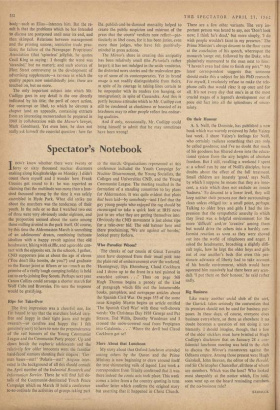On their Honour A. S. Neill, the Dominic, has published
a new book which was warmly reviewed by John Vaizey last week. I share Vaizey's feelings for Neill, who certainly radiates something that can only be called goodness; and I've no doubt that much of his goodness has filtered down into the educa- tional system from the airy heights of absolute freedom. But I still, recalling a weekend I spent at a school run by one of Neill's disciples, have doubts about the effect of the full treatment. Small children are innately 'good,' says Neill, by which I suppose he means that they are inno- cent, a state which does not exclude an innate 'badness.' To descend to a lower level, they will keep neither their persons nor their surroundings clean unless obliged to: a small point, perhaps. Talking to older boys and girls I had the im- pression that the sympathetic anarchy in which they lived was a helpful environment for the more 'difficult' and/or 'creative' among them but would drive the others into a harshly con- formist reaction as soon as they were shoved out into the world of telephones and anger. I asked the headmaster, broaching a slightly diffi- cult topic, how he kept the older boys and girls out of one another's beds (for even this pas- sionate advocate of liberty had to take account , of his hostile environment, which would have squeezed him massively had there been any scan- dal). '1 put them on their honour,' he said rather sadly.














































 Previous page
Previous page